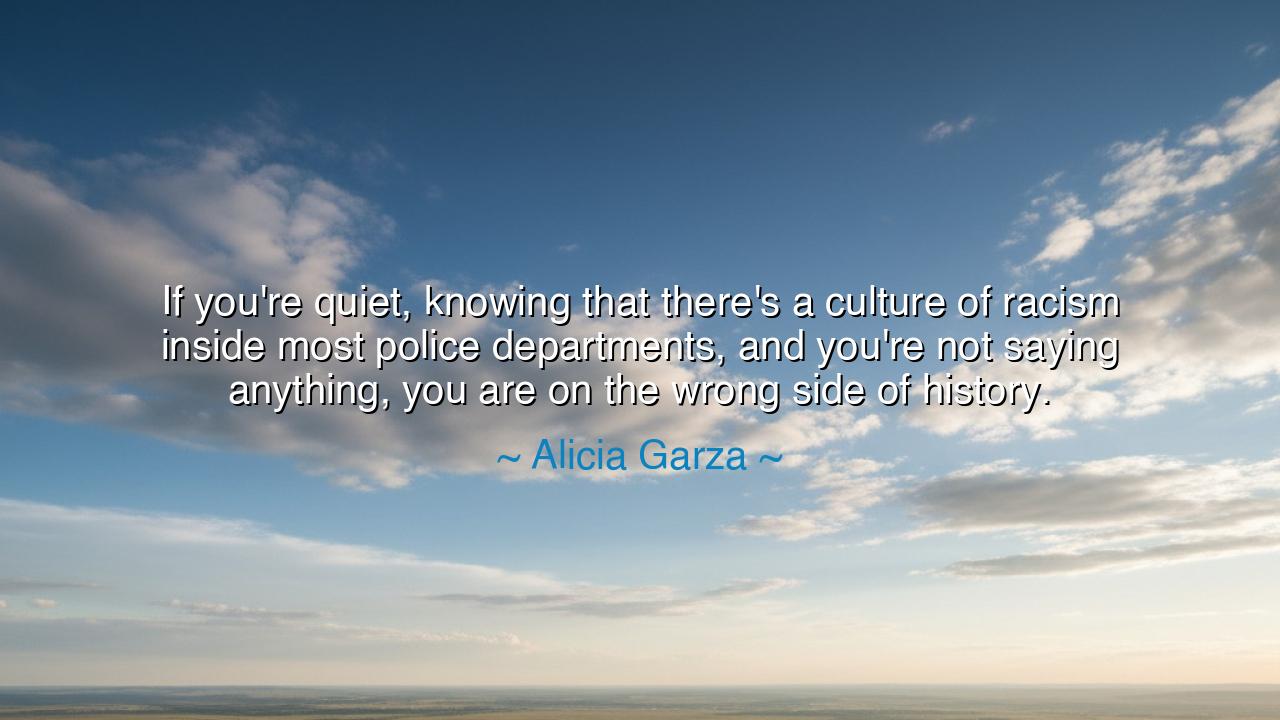
If you're quiet, knowing that there's a culture of racism inside
If you're quiet, knowing that there's a culture of racism inside most police departments, and you're not saying anything, you are on the wrong side of history.






“If you’re quiet, knowing that there’s a culture of racism inside most police departments, and you’re not saying anything, you are on the wrong side of history.” Thus spoke Alicia Garza, one of the founders of the Black Lives Matter movement, a voice that rose from the depths of injustice to call an age to conscience. Her words are not gentle; they are a flame meant to awaken the slumbering heart. In them is the timeless cry of the prophets, the warning of history’s judges: that silence in the face of oppression is itself an act of betrayal. For to see evil and remain unmoved is not neutrality — it is participation.
When Garza speaks of being “on the wrong side of history,” she summons an ancient and moral truth: that time itself remembers the deeds and silences of humankind. History, though written by men, is ultimately judged by the moral order that transcends them. Her words reach beyond the present struggle between communities and law enforcement; they speak to the eternal conflict between justice and complacency. For there have always been those who oppress, and those who resist — but the greater battle has always been for the souls of those who watch and say nothing.
The origin of this quote lies in Garza’s years of activism amid the storms of racial injustice in the United States. After the deaths of unarmed Black men and women — names now written into the conscience of a generation — she, along with others, raised a movement that became a mirror for the nation. The “culture of racism” she names is not a single act, but a pattern woven into institutions over centuries. It is the quiet tolerance of prejudice, the turning away from pain that is not one’s own, the systemic blindness that allows inequality to live while justice sleeps. In denouncing silence, Garza does not condemn only the guilty, but also calls to the indifferent — those who, though not wielding the weapon, consent to its power through inaction.
History bears witness to the truth of her words. In the dark years of the American Civil Rights Movement, there were those who fought bravely — and there were those who remained silent, preferring peace over justice. When Martin Luther King Jr. sat in a Birmingham jail, he wrote not to his enemies, but to his allies — to the so-called moderates who urged him to wait, to be quiet, to let time heal what courage alone could mend. “Shallow understanding from people of good will,” he said, “is more frustrating than absolute misunderstanding from people of ill will.” In every age, it is not the tyrant alone who sustains oppression, but the silence of the comfortable.
To be quiet, Garza reminds us, is to choose the side of the oppressor. There is no neutrality when human dignity is at stake. The “culture of racism” she names thrives in silence — it grows when those who see wrong avert their eyes, when those who benefit from injustice mistake privilege for peace. Like a fire starved of air, evil cannot endure when confronted by collective courage. Yet courage demands speech; it demands that ordinary people risk comfort to stand in truth. For justice is not a gift that falls from heaven — it is the fruit of voices raised, hearts stirred, and consciences awakened.
Let us recall, too, the story of Dietrich Bonhoeffer, the German pastor who lived under the shadow of the Nazi regime. Many in his nation turned away from the cruelty around them, cloaking their silence in loyalty and fear. But Bonhoeffer, knowing that silence was complicity, spoke out, saying, “Silence in the face of evil is itself evil.” For his defiance, he was executed — yet his voice, like Garza’s, outlived the tyrants. It reminds us that moral courage is the price of moral survival. Those who speak may suffer; those who stay silent will be judged.
Thus, the lesson of Alicia Garza’s words is as clear as it is timeless: to see injustice and remain silent is to surrender one’s humanity. Each generation is called to choose — not between comfort and struggle, but between truth and false peace. When systems fail the people, it is the duty of the people to speak. When voices are silenced by fear, it is the duty of the brave to raise them. For history moves not by the hands of the powerful, but by the courage of the awakened.
So, my friends, let these words be a torch in dark times: do not be silent in the face of wrong. Speak where others whisper; act where others hesitate. Let your conscience be louder than your fear, and your compassion stronger than your convenience. For the measure of a life is not how comfortably it is lived, but how courageously it defends the truth. And when the judgment of history comes — as it always does — may it be said that you stood on the right side, that you did not turn away, and that your voice helped bend the long arc of the universe once more toward justice.






AAdministratorAdministrator
Welcome, honored guests. Please leave a comment, we will respond soon